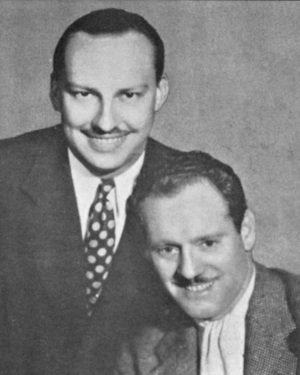Hudson-DeLange Orchestra

Will Hudson (l) and Eddie DeLange (r)
-
Featured Vocalists
Elisse Cooper
Jane Dover
Ruth Gaylor
Fredda Gibson
Nan Wynn
Not well-remembered today, the Hudson-DeLange Orchestra played what can be called “soft and gentle” swing music during the late 1930s. Lyricist Eddie DeLange formed the band in late 1935 but soon realized he needed help with arrangements and brought in Will Hudson, with whom he had written several songs, in return for a partnership in the group. DeLange led the orchestra, with Hudson working behind the scenes as musical director. The duo wrote a number of successful songs during this period, most notably “Moonglow,” all of which the band recorded for the Brunswick label. Most of the material released by the band were Hudson-DeLange originals.[1]
DeLange sang on some numbers, though the band relied primarily on female vocalists. Ruth Gaylor was the band’s first female singer, staying through November 1936, when Fredda Gibson replaced her.[2] Nan Wynn joined in early 1937, remaining until late 1937. Betty Allen, wife of the band’s sax player, Gus Bivona, took over from Wynn for a month in December 1937 before leaving for Europe. Mary McHugh, Jane Dover, and Elisse Cooper then sang. The orchestra proved popular with the eastern college crowd.
Conflict of personalities plagued the band. DeLange was outgoing and full of life, his mother a former Zeigfeld follies girl and his father a songwriter who had worked on Broadway. After spending time in Hollywood as a stuntman, he returned east and opened a roadhouse before deciding to get into the band business. The serious, bespectacled Hudson, on the other hand, could have been mistaken for an accountant. In the early 1938, the two men dissolved their partnership. Each had a different story to tell. Hudson claimed that audiences would ask for him during performances and were disappointed if he wasn’t there, as he only traveled with the band one week each month. He offered to buy out DeLange. DeLange told that the partnership was dissolved in order to get out of a booking contract. Hudson then came to him and asked to take over the band. DeLange put it to a vote of the musicians, and they choose Hudson.
DeLange formed a new band, and both he and Hudson worked separately for the next three years, with neither finding success.[3] They once again teamed up in 1941, but the new band quickly fell apart. Hudson went on to arrange for Glenn Miller’s Army Air Force orchestra during the war, while DeLange settled in Hollywood in the late 1940s to write for film, which he did until dying prematurely of a heart attack in July 1949 at age 45.
Notes
An October 1937 Down Beat article stated that Hudson and DeLange had won more than $4000 in prize money from ASCAP. Hudson also wrote a column for arrangers in Down Beat. ↩︎
Fredda Gibson later changed her name to Georgia Gibbs. Brunswick listed her name on the label as “Freddy” Gibson. ↩︎
Vocalists in Hudson’s 1940 band were Mike Rosati and Peggy McCall. Elisse Cooper remained with DeLange through at least August 1939. ↩︎
Sources
- Simon, George T. The Big Bands. 4th ed. New York: Schirmer, 1981.
- Advertisement. Fitchburg Sentinel [Fitchburg, Massachusetts] 28 Dec. 1935: 8.
- “Load of I. Mills Bookings Keeps Band Units Working.” Billboard 15 Feb. 1936: 11.
- Benham, J.A. “Dance Will Last Until 4.” The Daily Princetonian 20 Mar. 1936: 1.
- “Hudson-DeLange Orchestra Provides Swing Tunes For Interfraternity.” The Lafayette 24 Nov. 1936: 1.
- LaFreniere, Chas. F. “Harvard Man Finds Swing Popular with 'Swells.'” Down Beat Feb. 1937: 11.
- “They Didn't Grab At Every Offer.” Down Beat Oct. 1937: 18.
- Orodenker, M.H. “Reviews of Records.” Billboard 14 Aug. 1937: 11.
- Orodenker, M.H. “Orchestra Notes.” Billboard 4 Dec. 1937: 16.
- Orodenker, M.H. “Reviews of Records.” Billboard 4 Dec. 1937: 17.
- Orodenker, M.H. “Orchestra Notes.” Billboard 25 Dec. 1937: 16.
- “Unison Saxes To Identify Hudson's Band.” Down Beat 1 May 1940: 2.
- “Hudson-DeLange Together Again?” Down Beat 15 Jul. 1941: 8.
- “Will Hudson, Ed DeLange Trying Again.” Down Beat 1 Sep. 1941: 2.
- “Single Slants: Georgia Gibbs.” Down Beat 15 Aug. 1943: 17.
- “Eddie DeLange, Composer, Dies.” Down Beat 26 Aug. 1949: 1.